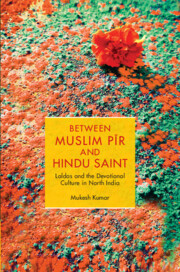Book contents
- Frontmatter
- Dedication
- Contents
- List of Figures, Maps and Tables
- Acknowledgements
- List of Abbreviations
- A Note on Transliteration
- Maps
- 1 The Spectre of Binaries
- 2 Laldas and Religious Duality of Pīr and Sant
- 3 The Laldas Shrines and Inter-religious Disputes
- 4 A Fait Accompli: The Complete Hinduisation of the Laldas Order
- 5 Religious Reform and Shared Shrines
- 6 Concealment and Secrecy: Hidden in Plain Sight
- 7 Poetic Response to Religious Puritanism
- 8 An Ephemeral Line in the Sand
- Appendices
- Glossary
- Bibliography
- Index
1 - The Spectre of Binaries
Published online by Cambridge University Press: 30 April 2024
- Frontmatter
- Dedication
- Contents
- List of Figures, Maps and Tables
- Acknowledgements
- List of Abbreviations
- A Note on Transliteration
- Maps
- 1 The Spectre of Binaries
- 2 Laldas and Religious Duality of Pīr and Sant
- 3 The Laldas Shrines and Inter-religious Disputes
- 4 A Fait Accompli: The Complete Hinduisation of the Laldas Order
- 5 Religious Reform and Shared Shrines
- 6 Concealment and Secrecy: Hidden in Plain Sight
- 7 Poetic Response to Religious Puritanism
- 8 An Ephemeral Line in the Sand
- Appendices
- Glossary
- Bibliography
- Index
Summary
In the first two decades of the twenty-first century, temples dedicated to Laldas, who was born to Muslim parents, have mushroomed all over north India. Although he is currently mostly worshipped by the Hindu caste of Baniyas (merchants or traders), Laldas was historically known for having a dual religious identity as a Sufi pīr (Islamic mystic or saint) among Muslims and bābā or sant among Hindus. He preached nirgu bhakti (formless devotion) to the Hindu god Ram, lived a married life, combined ‘Islamic’ and ‘Hindu’ religious doctrines and developed a distinct form of religiosity shared by people across religious denominations. The saint taught his followers to observe five rules: to refrain from killing animals and eating meat (particularly beef); to abstain from alcohol consumption; to avoid partaking of any food in their daughter's home; to not cultivate tobacco and sugar cane in the area; and to avoid stealing. The ultimate objective for devotees from diverse socioreligious backgrounds was to continuously chant the name of Ram.
Laldas and his teachings straddled the boundaries of ‘Islam’ and ‘Hinduism’. But his main followers, Hindu Laldasis of the Baniya background and Muslim Laldasis of the Meo Muslim background, began to identify him more closely with either ‘Islam’ or ‘Hinduism’ in the twentieth century. Born into a Meo Muslim family in the sixteenth century (1540 CE) as Lal Khan Meo, the saint is presently more popular under the designation of Baba Laldas. Following his guru Kabir, Laldas not only advocated worshipping ‘God’ in a nirgu bhakti manner but also lived by the values of ‘Islam’ in his personal life. Like Kabir, Laldas, his religious instructions and the Laldasi panth (religious path or way) founded by his followers traditionally did not discriminate on caste and religious levels. The saint considered institutional religious identities as impediments in the path of bhakti (devotion). His teachings are still followed by people of both religions. But the saint's identity and associated religious practices have recently been transformed, indicating a shift from a shared liminal religious entity to an emerging component of north Indian devotional Hinduism.
This book is an attempt to understand historically and anthropologically a changing form of religious culture around the bhakti figure and the religious order of Laldas that has undergone multiple transformations since its inception in the sixteenth century.
- Type
- Chapter
- Information
- Between Muslim Pīr and Hindu SaintLaldas and the Devotional Culture in North India, pp. 1 - 38Publisher: Cambridge University PressPrint publication year: 2024
- Creative Commons
- This content is Open Access and distributed under the terms of the Creative Commons Attribution licence CC-BY-NC 4.0 https://creativecommons.org/cclicenses/

